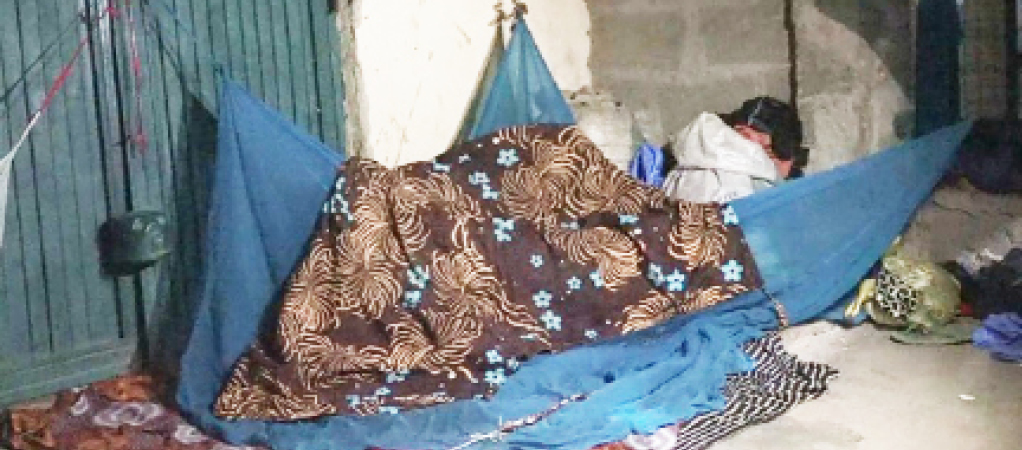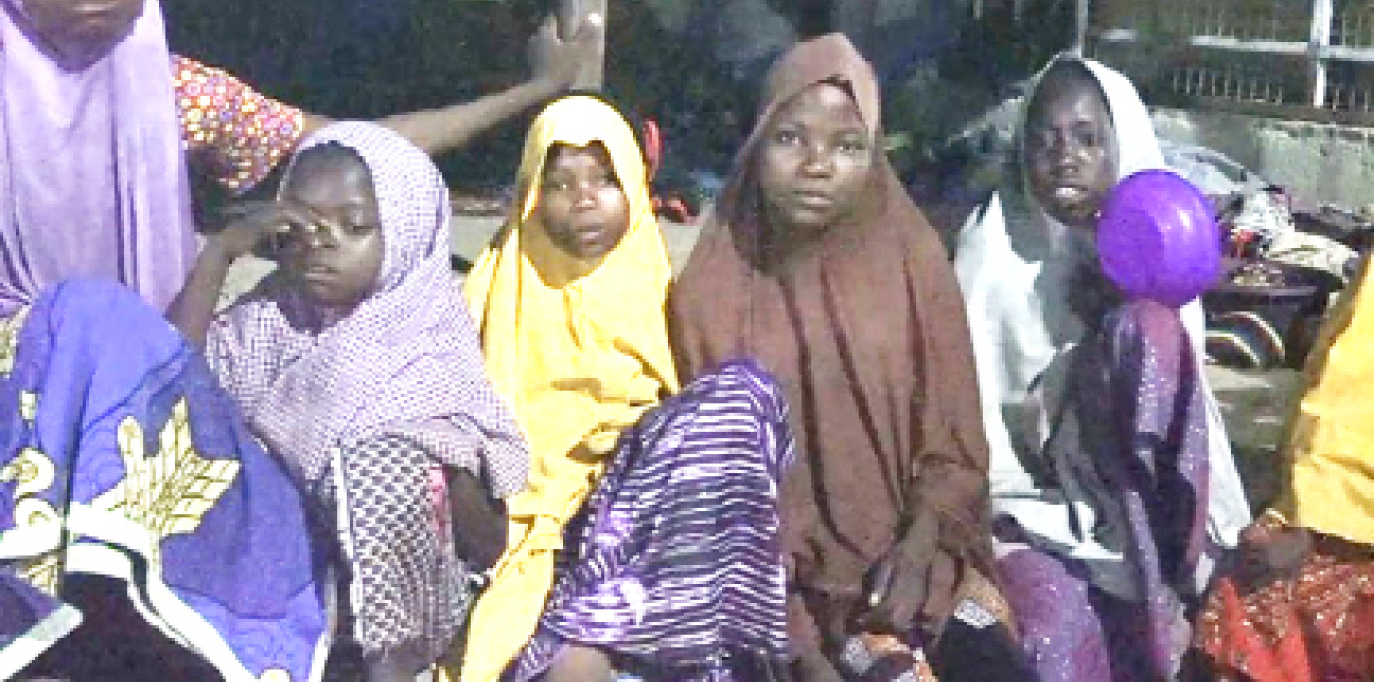Bilki Ibrahim and 20 other displaced persons in Zanfara State got a last-minute hope that made them not spend the night on empty stomachs.
At about 11pm on a Friday, a Good Samaritan passing by had pity on these persons who were thrown into the streets by banditry and gave them two sachets of spaghetti. He is said to have been regularly giving out the little he can whenever he comes around.
Ibrahim and many others like him cook by the roadside and share the little they have, to at least keep hunger away for a while before morning.
The story of displaced persons flooding Gusau, the Zamfara State capital, is that of sadness, neglect and despair. The majority of them live in the streets and sleep in front of shops after business closing hours. Their faces often tell the tale of hopelessness as they use whatever they have to cover themselves as they stay by the roadside through the night.
- Why Maiduguri needs additional markets
- Afrobeats to the world: Nigerian artistes dominating global stages
Narrating their experiences to Daily Trust Saturday, Ibrahim said, “We were sleeping when they attacked and started killing our people. We don’t know where most of our people are.
“We were told that some people relocated to Sokoto. We are in dire need of help, at least shelter and feeding. We always beg to get what to eat, but for shelter, you can see for yourself.
“We have at least 20 children here with us while all our husbands are either killed or are nowhere to be found. We are just managing places temporarily. When we are chased away, we look for another place.”

N700 for a night
It was learnt that despite the situation these displaced persons have found themselves in, they are made to pay before they are allowed to spend the night in front of most shops.
They told our correspondents that shop owners only allow them to spend a night in front of their shops after paying N700.
“We don’t just come here and sleep; we do that with the knowledge of the shop owners. For example, we pay N700 everyday to be allowed to sleep in this place.
“Every day, we spread ourselves across streets begging for money because that is a priority. Even if we don’t get money to feed, that of shelter is very important.
“Normally, we converge here around 11pm when the shop owner is about to close, and after he closes for the day, the place becomes ours,” Ibrahim added.
Daily Trust Saturday observed that the story is the same in majority of the streets across the state capital and its environs.
Others have also chosen to reside in remote locations at the outskirts, but places where they could trek to the town every morning and night.
Also recounting her ordeal, another displaced person, a middle-aged woman and mother of four who identified herself as Sadiya, whose husband was killed in the middle of a night, said she usually slept on bare sand under a shed. As a result of her situation she became very ill but there was no one to cater for her.
“For four days now, my stomach has been paining me a lot; and most of the time, I feel dizzy. We are victims of banditry. We left our village, Isa, Sabon Birni, Sokoto for the past three months.
“They ransacked our village and killed our parents and husbands. We cannot go back, that is why we now live by the roadside here.
“We normally go about begging for the day, and after the shops have closed, we find a place to sleep in front of them.
“Most of our husbands are dead while we don’t know where others are. My husband was killed and I was left with four children. Two of them were killed and I am left with two. They are currently out begging. When they beg and find something, we eat, but if they don’t get anything, we sleep on empty stomachs.
“The bandits have been attacking us day and night. They started with five of our people who were in their farms and killed them. That was the genesis. Some of us are in Gusau here while some have gone to Sokoto. And we don’t know where others are. We are scattered,” she recounted, adding that her area – Isa, Mudachi, Danzange and Maru – is the worst hit.
From school to the streets
Daily Trust Saturday also reports that children of school age are bearing the consequences of insurgency and banditry as their villages were sacked and it appears there is no hope of returning home any time soon.
A 15-year-old Zainab told our correspondents that she had been forced to begging despite the fact that she was once a privileged child in school.
“Sometimes we get something when we go out to beg, but most of the time we don’t get anything and we return to our parents like that.
“We no longer go to school because there is no home anymore,” she said.
Unaisa Muhammad, who was lucky to have fled to Gusau alongside her husband and four children, said hoped to return home.
She said, “I have spent up to five months here. They usually come in the middle of the night and take the ones they want and disperse others. There is no hope at all. I am lucky to be here with my husband and our four children, but we are hoping to return home if there’s peace. We were forced out of our homes.”
Umaru Abubakar from Wurno village of Sokoto State, who also relies on begging to survive due to ill health, said, “I have been here for two years and three months. When the attack came, I was bedridden. I am suffering from partial paralysis. One of the village heads asked that they should bring me here until I get well and start walking.
“I returned to our village as my son wanted to get married, but 21 days after the marriage, there was an attack and he was killed in front of his house.
“On a fateful day, when I came out to go begging, another attack was launched. That was how I got myself running down here again. I am not very strong, so I can’t farm or do anything. The only thing I can do is beg to feed myself and my family.
“On the day of the attack, even poultry farms were not spared as they slaughtered the birds and went away with them. They also took cows and goats. In my house alone, they took over 30 chickens and other valuables.”
Residents offer accommodation
Aminuddeen Ibrahim, a resident of Gusau, however, said that despite the hardship being faced by Nigerians, residents extended helping hands to the displaced persons.
Ibrahim explained that Islam taught its followers to always help the needy, adding, “It is an obligation on every Muslim to help fellow Muslims whenever the need arises.
“We do help the displaced persons with second-hand clothes, foodstuff and other household valuables. Some of us that can afford provide shelter to them.”
Another resident, Muhammad Auwal Musa, said, “I personally provide one of the displaced persons with a room; the man is still living in the room free of charge. Although I am not feeding his family, at least I have alleviated his suffering.”
Also, Alhaji Isyaku Bello, a dealer of grains at Sabuwar Kasuwa Gusau, said he was accommodating two displaced persons with their families in his resident at Tudunwada quarters, noting, “Dozens of these displaced persons always come to this market to collect the remnant of grains after uploading trucks to feed their families.”
However, for Alhaji Saminu Muhammad, government should provide the displaced persons with shelter in order to halt their movements from one uncompleted building to another.
Muhammad explained that the displaced persons were gradually making the state capital a hub, adding, “In few years, the displaced will become something else in this city. So, the earlier the government takes appropriate measures of addressing this problem, the better.”

Lawmakers react
Rilwanu Marafa Anka, a lawmaker representing Anka Local Government, told Daily Trust Saturday that, “Anka Local Government, as one of the worst hit areas by banditry, is in a terrible situation. For 15 to 17 years now, the local government has been battling with banditry. There is no ward, district, village or town in this local government that is not affected by banditry.
“In fact, there is no minute or hour that you cannot see bandits moving freely, attacking, kidnapping and killing people in Anka Local Government. They have sacked many villages and towns.”
Rilwanu Anka, also known as Na-Gambo, said Anka town was hosting between 20,000 and 30,000 displaced persons, as according to him, between 200 and 300 villagers whose villages and town were destroyed by bandits are currently taking shelter in some public buildings, such as schools and the local government secretariat in Anka town.
Also commenting, Amiru Ahmad Keita, the lawmaker representing Tsafe West constituency and chairman, House Committee on Information, said there’s no ward in his constituency that is not battling with banditry.
“In my constituency, villages such as Bilbis, Danjibga, Kunchin-Kalgo, Keita-Kizara, Kwarin-Gano and Yandoto are affected by banditry.
“Also, villages like Yan-kuzo and Kafin-Alhaji in Tsafe east, and others, such as Sakajiki, Magami, Dansadau, Yar Doka, Kaurar Namoda, Shinkafi, Kuryar Madaro, Kagara, Bakura and Anka are badly affected.”
He said that government, in its efforts to address the situation, had presented two executive bills: Community Protection Guards and Security Trust Fund to the State House of Assembly.
“So far, we have studied how Borno State came up with the Civilian JTF and received contributions from various security agencies. We have passed the two bills, and the state government will soon establish the security outfit. Also, arrangements have reached advanced stage to launch the Security Trust Fund,” he said.
Keita called on the federal government to consider the situation in Zamfara, saying the state needs additional personnel and support to address it.
No IDP camp in Zamfara
Daily Trust Saturday gathered that despite the number of people affected by banditry in Zamfara, the state does not have camps for internally displaced persons.
Efforts by our correspondents to reach out to the authorities concerned were not successful as calls and text messages sent to them were not attended to. Interviews were also declined in some quarters.
Similarly, efforts to speak to the police command in the state through their public relations officer, Yazid Abubakar, were not successful.
The origin of banditry in Nigeria dates back to the inability of governments at all levels to resolve, and find a lasting and mutually beneficial solution to farmer-herder conflicts.
While dozens of cattle routes grazing reserves have been taken over by various factors, among them environmental degradation, urbanization and outright neglect, many farmers were finding it difficult to work on their farmlands because of similar factors.
As a result, herders were left with no option than to fight encroaching herders and in the mid of this, the herders also fight back, a development and degenerated into full blown conflict occasion by cattle rustling.
While some years back the situation was more intense in North Central, farmer- herder conflict has led to to loss of thousands of lives in almost all parts of the country but more visible in North West now.
This criminal activity which has taken a different diemension has led to displacement of millions of people.

 Join Daily Trust WhatsApp Community For Quick Access To News and Happenings Around You.
Join Daily Trust WhatsApp Community For Quick Access To News and Happenings Around You.


